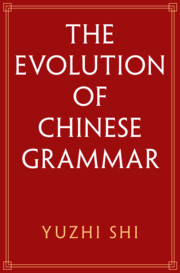Book contents
- The Evolution of Chinese Grammar
- The Evolution of Chinese Grammar
- Copyright page
- Dedication
- Epigraph
- Contents
- Figures
- Tables
- Acknowledgments
- Conventions Used in the Examples
- Abbreviations and Symbols
- 1 Some Preliminaries
- 2 Copular Word and Construction
- 3 Focus and Wh- Words
- 4 Serial Verb Construction
- 5 Disyllabification
- 6 Resultative Construction
- 7 Information Structure
- 8 The Passive Construction
- 9 The Disposal Construction
- 10 Verb Copying and Reduplication
- 11 The Comparative Construction
- 12 The Ditransitive Construction
- 13 Aspect and Tense
- 14 Negation
- 15 The Boundedness of the Predicate
- 16 Classifiers
- 17 Demonstratives from Classifiers
- 18 Distal Demonstratives from Phonological Derivation
- 19 Pronouns, Plurals, and Diminutives
- 20 Structural Particles
- 21 Word Order and Relative Clauses
- 22 Conclusions
- References
- Primary Sources of Texts
- Index
5 - Disyllabification
Published online by Cambridge University Press: 16 March 2023
- The Evolution of Chinese Grammar
- The Evolution of Chinese Grammar
- Copyright page
- Dedication
- Epigraph
- Contents
- Figures
- Tables
- Acknowledgments
- Conventions Used in the Examples
- Abbreviations and Symbols
- 1 Some Preliminaries
- 2 Copular Word and Construction
- 3 Focus and Wh- Words
- 4 Serial Verb Construction
- 5 Disyllabification
- 6 Resultative Construction
- 7 Information Structure
- 8 The Passive Construction
- 9 The Disposal Construction
- 10 Verb Copying and Reduplication
- 11 The Comparative Construction
- 12 The Ditransitive Construction
- 13 Aspect and Tense
- 14 Negation
- 15 The Boundedness of the Predicate
- 16 Classifiers
- 17 Demonstratives from Classifiers
- 18 Distal Demonstratives from Phonological Derivation
- 19 Pronouns, Plurals, and Diminutives
- 20 Structural Particles
- 21 Word Order and Relative Clauses
- 22 Conclusions
- References
- Primary Sources of Texts
- Index
Summary
This chapter discusses phonological motivations for morpho-syntactic changes in history. In general, Old Chinese was monosyllabic, which means that the overwhelming majority of words were represented by a single syllable, regardless of whether they were content or function words. In Middle Chinese, the phonological system was dramatically simplified; the number of consonants and vowels was reduced, and the syllabic structures were simplified. To restore the phonological distinctions of lexical items, the language increased the number of syllables for words, typically by adding one syllable to originally monosyllabic words. This disyllabification tendency has lasted nearly two millennia since then. This new sort of prosodic unit stimulated the fusion of two monosyllabic items, a key factor for the emergence of the resultative construction and other grammatical morphemes.
- Type
- Chapter
- Information
- The Evolution of Chinese Grammar , pp. 78 - 105Publisher: Cambridge University PressPrint publication year: 2023



